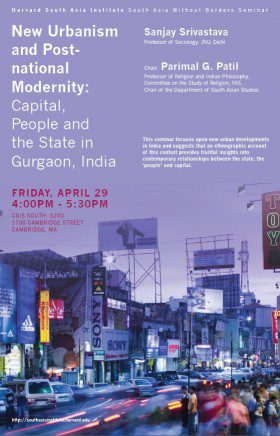South Asia Without Borders Seminar
Sanjay Srivastava, Professor of Sociology, JNU, Delhi
Chair: Parimal G. Patil, Professor of Religion and Indian Philosophy, Committee on the Study of Religion, FAS, Chair of the Department of South Asian Studies
This paper focuses upon new urban developments in India and suggests that an ethnographic account of this context provides fruitful insights into contemporary relationships between the state, the ‘people’ and capital. The paper is organized around historical and ethnographic accounts of the privately developed DLF City in the North Indian state of Haryana. DLF City borders Delhi and is part of an area known as the National capital Region (NCR). In principle, a government body known as the National capital Region Planning Board is meant to oversee coordinated infrastructure and other forms of planning processes for the Region. In practice, urban processes within the NCR depend upon erratic relationships between real estate behemoths, the state and a variety of residents associations. This discussion proceeds through introducing the concepts of ‘post-national modernity’ and ‘moral consumption’. These, I suggest, allow us to explore the relationships noted above, as well as allowing for a tracking of the contours of a state formation that is part of the informality it seeks to banish. The discussion also outlines some of the ways in which new forms of urban citizenship emerge through the changing relationships suggested above, as well those that are submerged.

